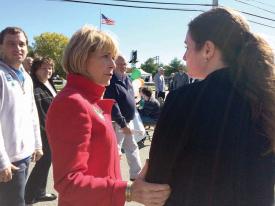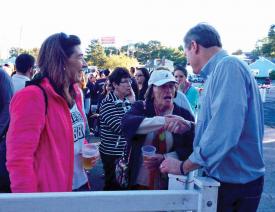October 16, 2014
Both top-tier gubernatorial candidates stopped by Sunday’s Irish Heritage Festival, an annual event in Neponset that Martha Coakley and Charlie Baker say they had attended before. The attorney general walked among the festival booth before noon while Baker, her Republican opponent, swung by in the final hour of the day-long festival. The candidates drew different receptions from the crowd, perhaps due to the more than 100 revelers who had gathered in a fenced-off beer garden next to Florian Hall by 4:30 p.m., when Baker showed up.
 Coakley: Martha Coakley speaks with Colleen Mason, a pre-K teacher, at the Irish Heritage Festival on Sunday morning. Photo by Lauren DezenskiState Rep. Dan Cullinane, who represents parts of Dorchester and Mattapan, introduced Coakley to the various vendors and attendees at the festival. Cullinane, who once worked in the attorney general’s office, is her campaign chair for organized labor. At one point, he remarked, “You can’t escape politics in this neighborhood,” to which Coakley replied: “it’s a blood sport.”
Coakley: Martha Coakley speaks with Colleen Mason, a pre-K teacher, at the Irish Heritage Festival on Sunday morning. Photo by Lauren DezenskiState Rep. Dan Cullinane, who represents parts of Dorchester and Mattapan, introduced Coakley to the various vendors and attendees at the festival. Cullinane, who once worked in the attorney general’s office, is her campaign chair for organized labor. At one point, he remarked, “You can’t escape politics in this neighborhood,” to which Coakley replied: “it’s a blood sport.”
She would know. There were few people at the festival when she arrived, but she had her supporters, among them Southie resident Gerald Fichner, who earnestly shook Coakley’s hand. “Thank you for your commission on mental health,” he said. “We need that badly.” Later, Colleen Mason, a pre-K teacher in the Boston Public Schools, approached Coakley to say she had her support, adding that her mother, a sixth grade teacher, was a supporter as well. Mason’s dad was standing nearby, and he, too, shook Coakley’s hand. “I won’t tell you who I’m voting for,” he said with a laugh. “You’ve already got two to one.”
As she was setting off off to the Columbus Day Parade in East Boston, Coakley praised her organization’s ground game as the campaign enters the final three weeks of electioneering.
“As somebody who ran here, who lived on South Munroe Terrace, who ran against Martin Walsh, our now wonderful mayor of Boston, it’s where I learned the importance of door-to-door knocking and talking to people,” Coakley told the Reporter.
 Baker: Charlie Baker shakes hands with supporters in the beer garden at the Irish Heritage Festival on Sunday afternoon. Photo by Lauren DezenskiBaker, whose visit to the festival was unscheduled, championed his ground game in an interview with the Reporter while playing down the help played by his campaign’s so-called supercomputer scraping data to get to would-be supporters. “I think technology is important,” he said. “It helps us make sure we do the right kinds of things before we head into Election Day, but there’s nothing like handshakes and a chance to talk to people face-to-face about their hopes and their dreams and their worries. “We’ve spent a lot of time in these communities knocking on doors and visiting with folks and I think people appreciate the fact that we showed up.
Baker: Charlie Baker shakes hands with supporters in the beer garden at the Irish Heritage Festival on Sunday afternoon. Photo by Lauren DezenskiBaker, whose visit to the festival was unscheduled, championed his ground game in an interview with the Reporter while playing down the help played by his campaign’s so-called supercomputer scraping data to get to would-be supporters. “I think technology is important,” he said. “It helps us make sure we do the right kinds of things before we head into Election Day, but there’s nothing like handshakes and a chance to talk to people face-to-face about their hopes and their dreams and their worries. “We’ve spent a lot of time in these communities knocking on doors and visiting with folks and I think people appreciate the fact that we showed up.
Festival participants seemed more receptive to his presence than the sparse morning crowd was to Coakley’s. As Baker walked out of Florian Hall and along the perimeter of the beer garden, a handful of supporters clutching plastic Bud Light cups clamored to reach over the fence to shake his hand and take photos. For his part, the candidate Baker was busy posing for photos with Dropkick Murphys lead singer and bassist Ken Casey, a Democrat who had endorsed Baker earlier in the week. One supporter flashed a smile, telling Baker, “I’m a Democrat but you have my support.”
•••
Baker wasn’t the only politician talking about technology last week. At a What Works panel sponsored by Politico and held at the Revere Hotel’s Theatre 1 on Friday, Mayor Marty Walsh talked proudly about the role technology has played in his administration as he gathered with civic leaders from across the country. Metrics and data-driven solutions at City Hall are key to changing the culture city-wide, Walsh told moderator Peter Canellos, the former Globe editorial page editor who is now at Politico.
In a discussion alongside Chattanooga mayor Andy Berke, the mayor used the opportunity to tout his newly released housing plan, which seeks to accommodate 700,000 Boston residents by 2030. Walsh said his plan’s investment in workforce housing, which would keep more families in the city, also means an investment in the city’s public education system. “We can’t depend on the federal government,” he said, adding that the country’s mayors must work together to resolve issues around housing.
Berke offered a warning about building but one type of housing a la the crops of condos springing up across Boston that attract little diversity beyond young and single buyers:
“Nothing will kill your city faster than just having one type of people.”
Topics:


